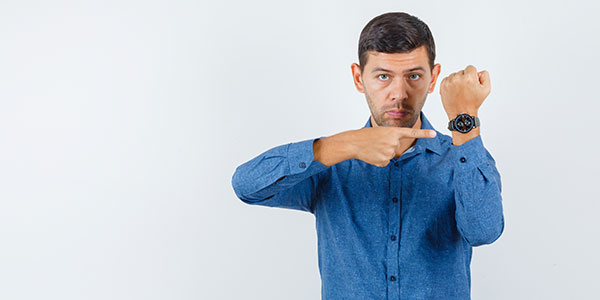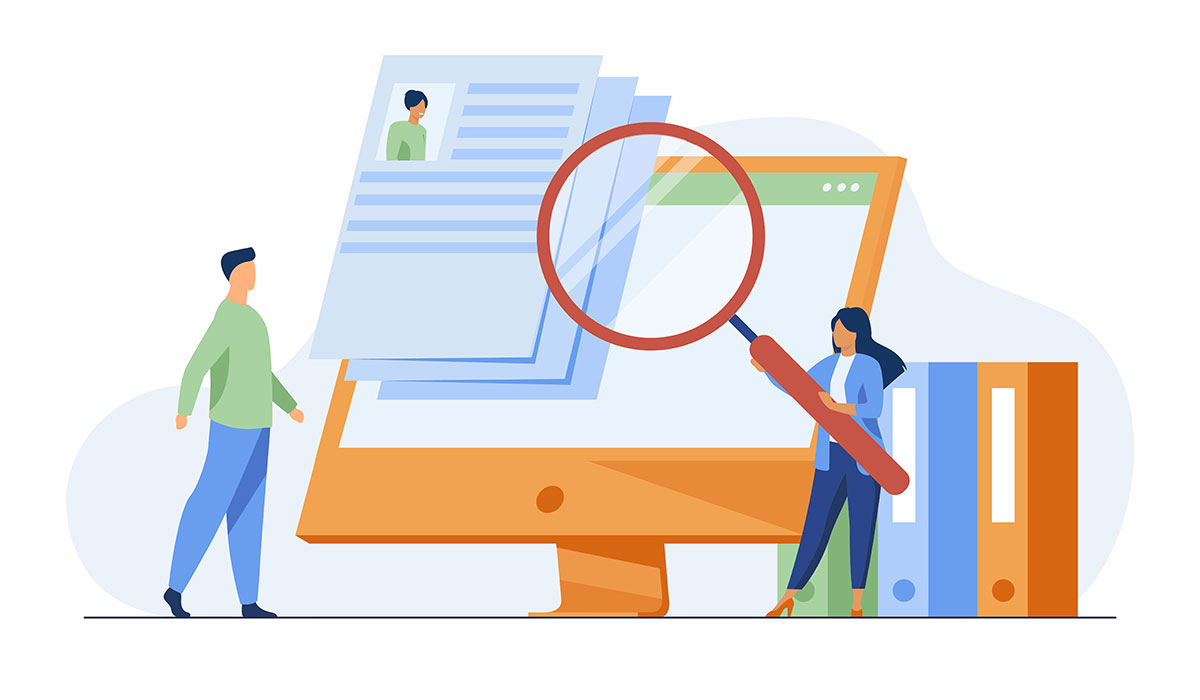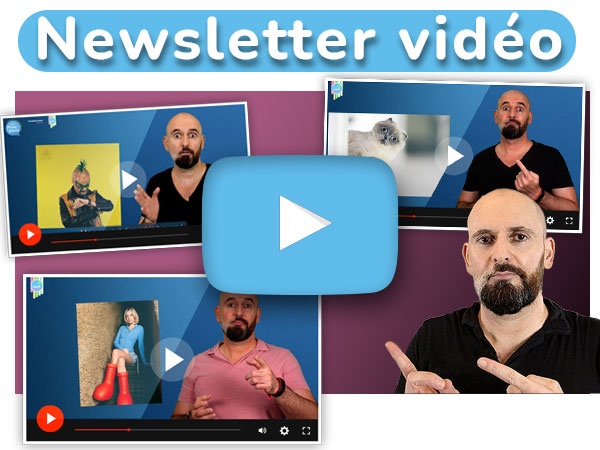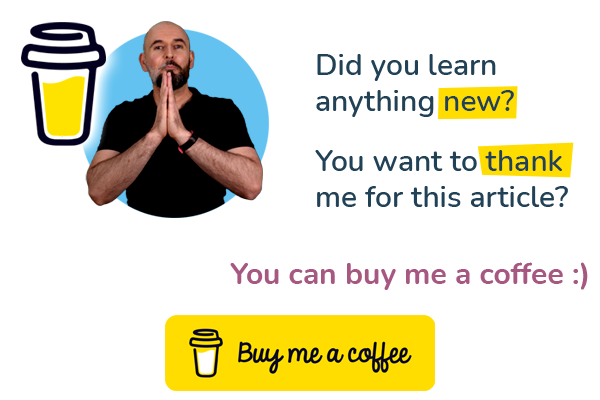Are you interviewing for a French job soon? Here are some tips to help you prepare! Remember, the interviewer is likely to ask about your work experience, education and skills in French.
So be sure to research the company and the position you applied for, and practice your answers in advance. You’ll also want to make sure you can speak fluently and confidently during the interview.
Bonne chance !
French vocabulary for “un entretien d’embauche” (job interview)
Un entretien is a term that is synonymous with the word conversation.
But be careful, it is not a conversation with your friends at the coffee shop! Un entretien is always a serious conversation, in a formalized context.
For example, you can have un entretien:
- with your banker to ask for a loan,
- with your doctor to advise you on the best therapy after an accident,
- with the principal of your son’s school whose grades are slipping,
- etc.
You can use the following expressions:
- décrocher, obtenir ou avoir un entretien avec quelqu’un au sujet de quelque chose (pick up, get or have a conversation with someone about something)
- solliciter ou demander un entretien avec quelqu’un au sujet de quelque chose (ask or request a meeting with someone about something)
- accorder un entretien à quelqu’un (give someone an interview)
- mener un entretien (conduct an interview,)
- se présenter à un entretien d’embauche, passer un entretien d’embauche (to go for a job interview, to go for a job interview)
📌 Caution! In French, the word interview exists and is used only in the journalistic context. Une interview (the word is feminine) is used when a journalist asks questions to someone. In all other situations, you should use the word entretien (the word is masculine).
Do you like learning French with videos?
Receive our free video newsletter every Friday in your e-mail box. You will get 3 “Tips & Tricks” on grammar, vocabulary, phonetics or French culture.
👉👉 Sign up now!
There is also a verb derived from the noun entretien: s’entretenir avec quelqu’un (to talk to someone).
For example, you would say:
- Je m’entretiens régulièrement avec mes collègues allemands (I regularly interview with my German colleagues)
- Je me suis entretenu(e) avec le chef de service à propos de ces nouveaux contrats (I have spoken to the head of department about the new contracts)
- Je vais m’entretenir avec le DRH au sujet de ma demande de mutation (I’m going to talk to the HR manager about my request for a transfer).
Finally, the word embauche (hiring) is a synonym for recrutement (recruitment). It is when a person starts working in a company, in a store, etc.
Embauche is a feminine word, recrutement is a masculine word.
You can also use the verb embaucher (to hire):
- Nicolas a été embauché comme professeur par l’entreprise Chez Prisc & Chris. (Nicolas has been hired as a teacher by the company Chez Prisc & Chris)
Will your job interview be in French?
Don’t stress, keep your sentences simple and short and pay attention to:
the conjugation of your verbs (you don’t want to create a misunderstanding and say something in the past tense when you meant to say it in the present tense)
and also pay attention to your French phonetics, to make sure that your interlocutor understands everything you say. Unlike a French teacher, your interlocutor is probably not used to the typical mistakes of foreigners and their accent.
Our courses on the conjugation of the 50 most used verbs by the French and on French phonetics:
Codes to know for your first job interview in French
The CV and the cover letter
In France, writing a CV and attaching a cover letter is still the key to getting a job interview.
Avoid writing the same CV and cover letter to apply to 100 companies! It is terrible for the recruiter who notices it right away.
Take advantage of the fact that you are a foreigner and that you will bring a lot to the French company thanks to your culture and your language.
The dress code of French companies
The French generally attach great importance to their dress and appearance. And the professional world is no exception to this unspoken rule.
So to give yourself the best chance of success, when you go to a job interview, you should carefully choose the clothes you wear: sober, formal, elegant, with a touch of fantasy, why not?
Of course, everything will depend on the company, but for this first contact, it’s better to stay classic and banish jeans and sneakers!
And if, after this job interview, you get the job of your dreams, in France, you will have time to go back to a more natural outfit.
Punctuality in French companies?
Clichés have a way of getting around, and one of the most persistent ones in the minds of foreigners when they think of the French is that French people have a very flexible relationship with schedules, that punctuality is not one of their priorities.

This may be the case in their private life (and it really depends on the person), but in their professional life, the French attach great importance to punctuality, to what they call La politesse des Rois: Après l’heure, ce n’est plus l’heure… (After the hour, it’s not the hour anymore…)
You have plenty of sayings and proverbs in French that emphasize the importance of punctuality! So, on the big day, the day of your job interview in France, you will absolutely have to show up, not on time, but at least 15 minutes early.
Greetings
Once again, the first impression is often the one that will stay in the recruiter’s head, so you must be prepared for the first exchanges between him (or her) and you.
La bise (the kiss), yes, but not the first day!
Yes, I know, the French kiss each other. And even the pandemic hasn’t managed to put an end to this typically French custom.
If you’re employed, you’ll probably notice that the kiss has its place in the workplace. We kiss between friends, of course, but we can also do it between (good) colleagues.
But when you meet the recruiter, it is very likely that he or she will greet you with a “Hello? Follow me, please!
Wait for the handshake: some recruiters don’t like to shake hands, others prefer to do it at the end of the interview.
Tu or vous? Unformal or formal?
In France, workplace rules can vary: sometimes colleagues are on first-name terms with each other. Sometimes, we are polite to each other.
But on the day of your job interview, the tu will be taboo… So, if you’re not used to using vous, it’s now or never. It would be a catastrophic faux-pas to be on first-name terms with the recruiter!
How do you introduce yourself in French interview?
When you meet the person who is going to conduct the job interview, you have to introduce yourself and you can add phrases like:
- Je vous remercie de me recevoir (Thank you for having me)
- Je suis heureux/heureuse de vous rencontrer (I am happy to meet you)
And at the end of the interview you can say:
- C’était / ça a été un plaisir de vous rencontrer (It was/is a pleasure to meet you)
- J’ai été ravi(e) de m’entretenir avec vous (I was pleased to talk to you)
- Je vous remercie du temps que vous m’avez accordé(e) (I thank you for your time)
- Merci de m’avoir reçu(e) (Thank you for having me)
It is also a good idea to tell your interviewer that he/she can contact you after the interview if he/she has any questions:
- Je me tiens à votre disposition si vous avez des questions (I am at your disposal if you have any questions)
- N’hésitez pas à me contacter si vous avez d’autres questions (Don’t hesitate to contact me if you have any other questions)
Before you leave, don’t forget to tell him:
- Au revoir, bonne journée ! (Goodbye, have a nice day!)
10 common questions in a job interview in France and how to answer them
So, you’ve got a job interview in France! Congratulations! You’re one step closer to your dream job. But, there are a few questions that they’re likely to ask you that might stump you.
How do you answer them? Don’t worry – I’m here to help.
1. Quels sont vos points forts ? (What are your strengths?)
Toot your own horn a little here. This is your chance to sell yourself and make sure that the interviewer knows all of your positive qualities. But don’t go overboard – you don’t want to come across as arrogant. Just list a few of your key strengths and be prepared to back them up with examples.
2. Quels sont vos points faibles ? (What are your weaknesses?)
This is a tough one. You don’t want to list anything that will make the interviewer think twice about hiring you, but you also don’t want to lie.
The best thing to do is to be honest and talk about a weakness that you’re working on improving.
For example, you could say something like “I tend to get overwhelmed when I have a lot of projects on my plate, but I’ve been working on ways to better manage my time and prioritise my tasks.“
3. Pourquoi voulez-vous travailler pour notre entreprise ? (Why do you want to work for our company?)
Do your research before the job interview so that you can give a well-informed answer to this question. Talk about what you like about the company and how it aligns with your own values and goals.
For example, you could say something like “I was drawn to the company because of its commitment to sustainability and social responsibility. I want to work for a company that is making a positive impact on the world, and I feel like this is the right fit for me.“
4. Pourquoi voulez-vous quitter votre job actuel ? (Why do you want to leave your current job?)
Be careful how you answer this one. You don’t want to badmouth your current employer or make it sound like you’re not happy in your current position.
Instead, focus on the future and what you’re hoping to achieve in your new role.
For example, you could say something like “I’m looking for a new challenge and I feel like this job will give me the opportunity to grow and develop my skills.“
5. Quelle est votre expérience en … ? (What is your experience in…?)
Make sure you’re familiar with all of the key duties and responsibilities of the job you’re applying for so that you can talk about your relevant experience.
If you don’t have any direct experience, that’s okay – just try to speak to related experience or transferable skills.
For example, if you’re applying for a job in sales but have no previous sales experience, you could talk about times when you’ve successfully negotiated deals or persuaded people to buy things.
6. Pouvez-vous me parler d’un de vos projets professionnels réussis ? (Can you tell me about a successful professional project you’ve worked on?)
This is your chance to talk about a time when you’ve gone above and beyond in your job and achieved great results.
Choose a project that you’re proud of and that will show the interviewer what you’re capable of. Make sure to go into detail about your role in the project and what the outcome was.
7. Avez-vous déjà eu des difficultés avec un de vos collègues ? (Have you ever had any difficulties with a colleague?)
This is another tricky question. You don’t want to speak badly about anyone, but at the same time, you don’t want to make it sound like you’ve never had any conflict in the workplace.
The best thing to do is to choose a minor disagreement that was eventually resolved.
For example, you could say something like “There was a time when I disagreed with a colleague about how to handle a customer complaint. We talked it out and eventually came to a resolution that we were both happy with.“
8. Qu’est-ce qui vous motive dans votre travail ? (What motivates you in your work?)
This is your chance to talk about what drives you and what makes you passionate about your job.
Talk about what gets you excited to come into work every day and why you believe in the company’s mission.
For example, you could say something like “I’m motivated by the opportunity to help people and make a difference in their lives. I know that the work we’re doing here is making a positive impact, and that’s what keeps me going.“
9. Avez-vous des questions pour nous ? (Do you have any questions for us?)
This is your chance to show that you’re interested in the job and the company. Prepare a few questions in advance so that you don’t end up feeling caught off guard.
Some good questions to ask include:
- What are the company’s values and how do they guide decision-making?
- What are the biggest challenges facing the company right now?
- What opportunities are there for professional development?
- What does a typical day or week look like in this job?
10. Merci beaucoup pour votre temps, madame/monsieur. (Thank you very much for your time, ma’am/sir.)
This is your chance to thank the interviewer for their time and express your interest in the job. Make sure to shake their hand before you leave.
That’s it, we’ve covered it all. Now it’s up to you: you have all the tools you need to be at your best on the day of your job interview!
Although the thought of a job interview in a foreign language may be daunting, it’s definitely doable with some preparation.
So relax and get ready to show the interviewer what you’re made of!
And if you need any help mastering those pesky French grammar rules or vocabulary, don’t hesitate to reach out. We have plenty of resources to get you up to speed before your big day.
Bonne chance et à bientôt 😀👍
Articles that might interest you:
- Why do French people speak English so badly?
- Grasse (the French city) World Capital of Perfumes
- French Bastille Day: July 14th
- Who are the most popular French YouTubers?
- How the bag company “I speak fluent french” has released a new collection of bags?
- French Tipping Etiquette: 10 Things Everyone Should Know
- The French and their love of coffee
- Is the French manicure really from France?
- How to understand the gestures and mimics of the French?
- French Gastronomy





2 thoughts on “How to prepare for a French job interview?”
Comments are closed.